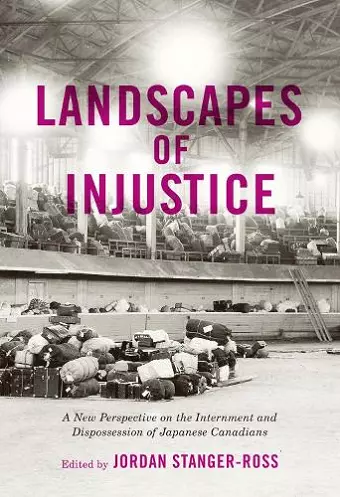Landscapes of Injustice
A New Perspective on the Internment and Dispossession of Japanese Canadians
Format:Paperback
Publisher:McGill-Queen's University Press
Published:20th Aug '20
Currently unavailable, our supplier has not provided us a restock date
This paperback is available in another edition too:
- Hardback£124.00(9780228001713)

A major reinterpretation of the internment of Japanese Canadians.
In 1942, the Canadian government forced more than 21,000 Japanese Canadians from their homes in British Columbia. They were told to bring only one suitcase each and officials vowed to protect the rest. Instead, Japanese Canadians were dispossessed, all their belongings either stolen or sold. The definitive statement of a major national research partnership, Landscapes of Injustice reinterprets the internment of Japanese Canadians by focusing on the deliberate and permanent destruction of home through the act of dispossession. All forms of property were taken. Families lost heirlooms and everyday possessions. They lost decades of investment and labour. They lost opportunities, neighbourhoods, and communities; they lost retirements, livelihoods, and educations. When Japanese Canadians were finally released from internment in 1949, they had no homes to return to. Asking why and how these events came to pass and charting Japanese Canadians' diverse responses, this book details the implications and legacies of injustice perpetrated under the cover of national security. In Landscapes of Injustice the diverse descendants of dispossession work together to understand what happened. They find that dispossession is not a chapter that closes or a period that neatly ends. It leaves enduring legacies of benefit and harm, shame and silence, and resilience and activism.
"This is a powerful book, marking a materialist turn in reflection on the internment of Japanese Canadians. The research collective pursues questions which, for all their focus on the details of asset liquidation -- of properties, footholds, intergenerational possibilities, built up slowly and patiently -- are not 'instead of' but deeply part of the human story of the internment. New ethnography and archival research with financial, community, and state records expose the variety of responses by Japanese Canadians, the multiplicity of logics into which officials folded racism, the breadth and variety of complicities. Landscapes of Injustice is vital reading for our moment of thinking about historical wrongs and the (im)possibility of reparations." Jennifer Henderson, Associate Professor, Carleton University, co-editor, Reconciling Canada: Critical Perspectives on the Culture of Redress
"Well written, clearly and effectively conceived and argued throughout, and intensely moving at times, Landscapes of Injustice is a significant book that both sheds light on the processes of dispossession and racial injustice and demonstrates the utility of collaboration to historians. ... [The authors] have created a deeply important work that challenges long-held beliefs about Canadian exceptionalism. In much the same way that historians have emphasized Canada's status as a settler colonial state, opposed Canada's growing militarism, or highlighted the ways in which violence served as an organizing force in Canadian colonial history, this book serves as a clarion call to Canadians that racism, government oppression, and cruelty do not stop at the forty-ninth parallel on their way north." H-Net
"Landscapes of Injustice is a particularly impressive and unprecedented study ... [The authors] have brought a fresh take to the wartime history of Japanese Canadians, and their careful research will help convince readers of the lasting implications of the wartime policies for Canadian society." BC Studies
- Winner of the Osgoode Society for Canadian Legal History 2022 John T. Saywell Prize for Canadian Constitutional Legal History
- Shortlisted for the UBC Library and the Pacific BookWorld News Society 2021 Basil Stuart-Stubbs Prize
ISBN: 9780228001720
Dimensions: unknown
Weight: 454g
496 pages